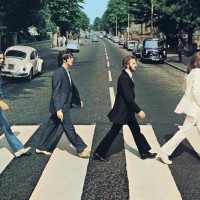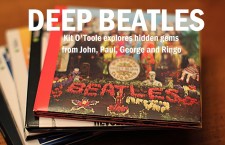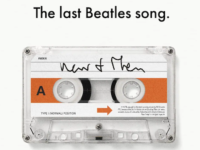For the next several columns, I will closely examine the legendary Abbey Road medley, their 16-minute magnum opus comprised of numerous song fragments. Where did these short works come from? How did they fit together so flawlessly? Deep Beatles digs deeper to take apart their famous and (technically) final work.
The song that leads off the medley is the last song recorded for Abbey Road: “Because,” a track notable not only for its lush harmonies but for Yoko Ono’s increasing influence on John Lennon’s craft.
Ono may be best known as an avant-garde artist, but she also was a classically trained pianist. One day in 1969, Ono and Lennon were lounging in their home when Ono began playing Beethoven’s Piano Sonata No. 14 in C-sharp minor, Op. 27, No. 2, otherwise known as the Moonlight Sonata. On a whim, Lennon asked her if she could play the chords backwards. Instantly he wrote the lyrics around the ensuing music; in 1980 Lennon seemed proud of the words: “The lyrics speak for themselves; they’re clear. No bullshit. No imagery, no obscure references,” he said.
Around the release of Abbey Road, Lennon stated that he anticipated writing many more songs with Ono. In a 1969 interview, Paul McCartney cited the lines “Because the world is round it turns me on” and “Because the wind is high it blows my mind” as some of Lennon’s best lyrics.
Recording began on August 1, 1969, with Lennon, McCartney and George Martin laying down 23 takes of the track. Lennon played electric guitar, Martin played the harpsichord, and McCartney plucked his usual bass; Ringo Starr added a hi-hat rhythm strictly for guiding purposes and was not on the final recording. After take 16 was judged best, Lennon, McCartney, and George Harrison painstakingly recorded their layered harmonies. Two more vocal tracks were added on August 4; the next day, Harrison performed a Moog part, which he recorded twice. The final product created a nine-part harmony effect due to the triple overdub.
“The harmony was pretty difficult to sing. We had to really learn it. But I think that’s one of the tunes that will impress most people. It’s really good,” Harrison said in 1969, adding that “Because” was his favorite Abbey Road tune.
Apart from the lovely harmonies and Ono’s part in composing “Because,” the track remains significant for another reason: it was the last time all four Beatles recorded a song together.
Against the beautifully restrained chords, Harrison, Lennon and McCartney croon philosophical and mysterious phrases. In addition to the aforementioned lyrics, Lennon also penned the lines “Because the sky is blue, it makes me cry,” the image being a popular one in his later tunes (most notably calling women “the other half of the sky” in the ballad “Woman”).
McCartney told biographer Barry Miles that he suspected Ono suggested the images of nature. “I wouldn’t mind betting Yoko was in on the writing of that, it’s rather her kind of writing: wind, sky and earth are recurring, it’s straight out of Grapefruit and John was heavily influenced by her at the time,” he said. However, another frequent trope appears, this one Beatles-centric: the power of love. They had previously sung “All You Need Is Love,” and on Abbey Road would sing the immortal lines “And in the end, the love you take is equal to the love you make.”
Here Lennon declares “Love is old, love is new; love is all, love is you,” assigning the word a spiritual meaning. Love encompasses everything, love is in all of us — these are heady themes for a rock song. Yet, “Because” succeeds at being deep yet accessible simultaneously.
While no demo seemingly exists, Lennon did briefly sing “Because” during his and Ono’s 1969 Montreal bed-in. In 1996, the Anthology 3 collection revived the song by eliminating the instrumentation, fully revealing those complex harmonies. The Cirque du Soleil show Love enhanced this version with some birds twittering in the background; audiences still cite the chilling effect “Because” occurs during the Las Vegas production.
No matter what version, “Because” represents the Beatles at their best lyrically and vocally, and perfectly introduces the intricate Abbey Road medley.
- The Rescued Early Paul McCartney Song That Completed ‘Beatles For Sale’ - December 4, 2024
- A Rare Beatles Cover Proves John Lennon Was Wrong About His Voice - November 26, 2024
- How John Lennon Came Roaring Back on the Beatles’ White Album - November 22, 2023





The vocal version of “Because” is astounding. In fact, all of Abbey Road shows that even though The Beatles were soon to break up, they could still play.
Even the remixed Let It Be … Naked is fascinating when played against the original version produced by Phil Spector. In many ways, Spector’s mix sounds like a weakened band ready to fall apart; but the well balanced remix shows that they were still very solid as a working unit.
I think the last song where all 4 beatles were together recording at the studio was “I Want You (She’s So Heavy)”, a song that was recorded on many different takes and even different locations.
Lennon’s later phrase “the other half of the sky” referencing women is rooted in a very famous phrase from that era. It was Mao Zedong–Lennon’s famous “Chairman Mao”– who said, “women hold up half the sky.” This phrase was widely referenced in feminist and women of color circles, adding to a discourse that John, possibly through Yoko, was quite familiar with.
Hmm, I never considered this song part of the medley. To me, the medley starts with “You Never Give Me Your Money”.
I’m curious, what are the arguments for including “Because” in the medley?
I agree with the Shelley. There is a clear ending to and break between “Because” and “You Never Give Me Your Money” on the album. It doesn’t sound like it’s part of the medley.
Wikipedia also lists “You Never Give Me Your Money” as the first song of the medley.
That said, I really enjoyed Kit’s breakdown of the song. Great writing!
I agree, insightful writing and thanks also to Kit for posting the demo, fascinating to hear.
Actually there are two very rough writing demos John recorded to tape. They’re not fantastic, but they are a interesting to hear if you love the song. The Abbey Road version is nothing short of astonishing.
Geoff Emerick tells a good tale in his book about the recording and how John asked Yoko to wait for him while he and the others knocked off the final vocals. John wanted this one to go out as it did, even if it meant an hour or two away from Yoko to record those gorgeous (live) harmonies with Paul and George.
It certainly is one of my favorite all-time Beatle songs!
Thank you all for your insightful comments! A couple of other people have asked me why I counted “Because” as the beginning of the medley instead of “YNGMYM” (hate to abbreviate it like that, but it’s easier). In addition to other sources I consulted counting it as part of the medley, I always thought it perfectly led into “YNGMYM” with that final chord. Note how it seamlessly blends into the beginning of the next song. Plus it effectively separates the other tracks–most notably “Here Comes the Sun”–from the medley. Its quiet, delicate nature and gorgeous yet haunting harmonies provide an introduction to the rest of the medley. It definitely has the effect of making the listener stop in his/her tracks, thus preparing the person for the, as I said before, magnum opus.
But I totally understand the other points of view–that’s one of the best aspects of Beatles music. We can analyze their catalog forever! And thank you for your kind comments about my writing.
You’re right Kit, that final chord of Because does kind of resolve into You Never Give. I would still count the Money as the start of the medley, but perhaps Because could be thought of as kind of overture.
For your consideration: the Abbey Road-medley in The Beatles Rockband videogame starts with You never give me your money. It’s an official game, Apple kinda is involved and I bet sir Paul also had his opinion.
I was thinking about this topic further, and thought of another reason I considered “Because” as being a sort of prologue to the medley–the unresolved chord at the end that is resolved at the beginning of “YNGMYM” (as Shelley has also pointed out). Also, it’s interesting to note how the subject of love is introduced in “Because” and repeated emphatically in “The End.” So thematically it comes full circle as well.
I’ve been receiving many opinions about where the medley stops and starts–what a fascinating discussion this has been!